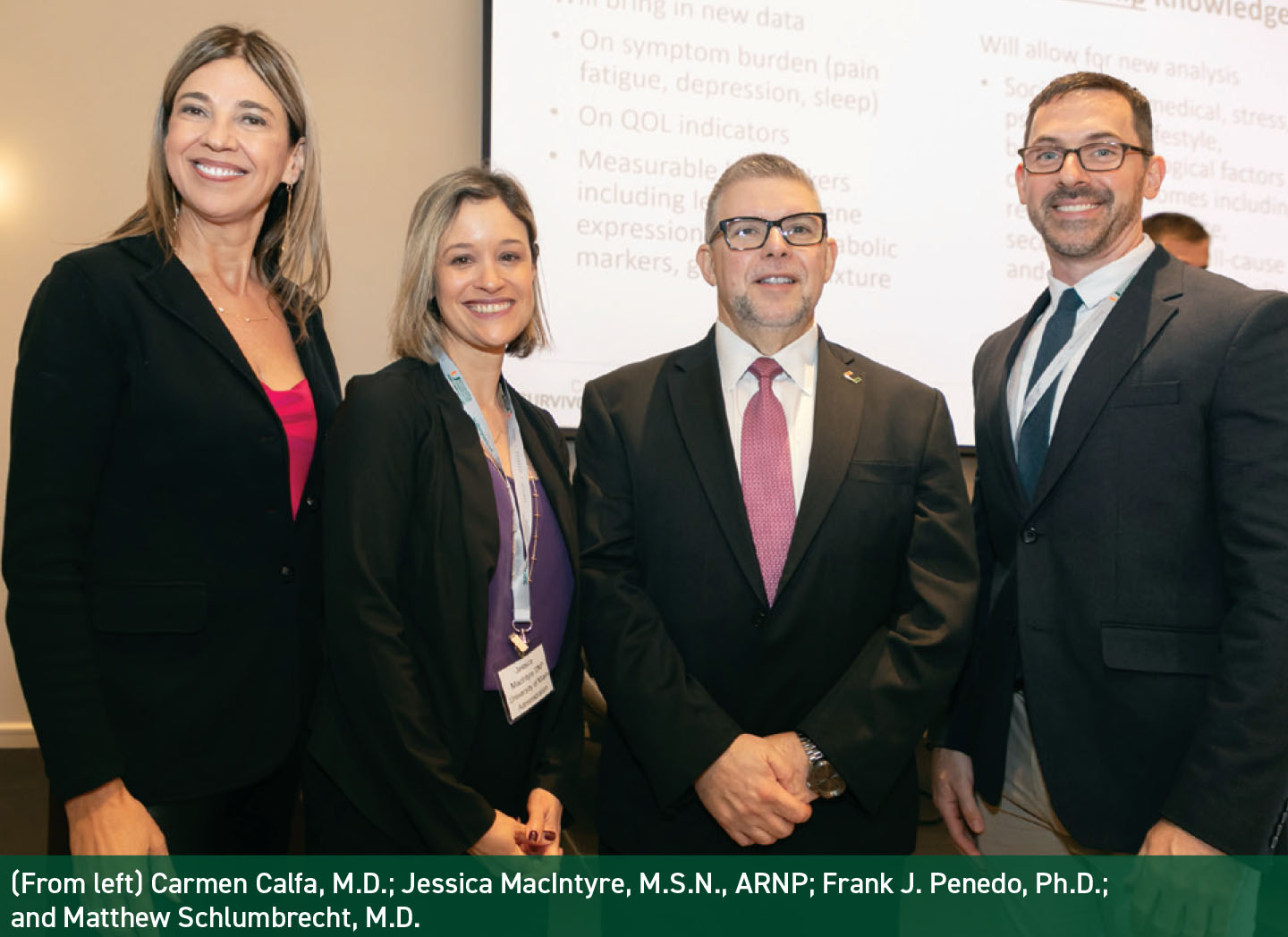More than 160 attendees took part in a day of learning and collaboration.

The Sylvester Comprehensive Cancer Center hosted the inaugural Cancer Survivorship Symposium, Nov. 11, 2022, in Coral Gables, Fla., and featured 17 program sessions, eight exhibitors, and a distinguished keynote address highlighting various aspects of cancer survivorship in research and clinical services.
Sylvester organized the symposium to bring together the clinicians and researchers who are dedicated to meeting the unique needs of the growing number of survivors within the community Sylvester serves.
“The Sylvester survivorship team exemplifies principles of excellence, teamwork, and the importance of community,” said Stephen D. Nimer, M.D., director of Sylvester, Oscar de la Renta Endowed Chair in Cancer Research, and executive dean for research at the University of Miami Miller School of Medicine, in his opening remarks. “We have recruited tremendous individuals who bring the most cutting-edge research to patient care. The way we take care of our patients today impacts future survivors, their families, and caregivers.”
This symposium provides an opportunity to come together to discuss innovative and transformative research programs and robust clinical services, as well as gain perspectives and guidance from our survivors,” added Frank J. Penedo, Ph.D., associate director, Cancer Survivorship and Translational Behavioral Sciences director of Cancer Survivorship and Supportive Care at Sylvester. “These meetings create a forum for exchanging ideas, discussing opportunities, and planning for the future of cancer survivorship research and care.”
Kicking off the morning program were various talks on technology delivered psychosocial interventions and assessments. The implementation of Sylvester’s My Wellness Check has proven to be associated with lower rates of emergency room visits and hospitalizations in survivors since its launch in June. The assessment is also the first electronic health record integrated symptom and supportive care needs assessment for ambulatory oncology care with Spanish-speaking patients.
In serving the diverse communities of South Florida, Sylvester researchers have made great progress in understanding the differences in diagnoses, treatment responses and outcomes in different races, ethnicities and patient populations.
Paulo S. Pinheiro, M.D., Ph.D., research associate professor at Sylvester and the Miller School’s Department of Public Health Sciences, opened the session by addressing Hispanic cancer patients’ worse survivorship outcomes relative to other ethnicities.
Dr. Pinheiro’s research showed how many Hispanics face challenges in their survivorship journey because of economic inequalities, access to care, and receiving less screening. To better understand factors that promote optimal adjustment and survival among Hispanics diagnosed with cancer, Matthew Schlumbrecht, M.D., medical co director of survivorship clinical research programs at Sylvester, continued the conversation, bringing attention to the South Florida Caribbean Black community. His presentation showed how Black men and women born in the U.S. have different cancer survival rates than those born in the Caribbean and Africa. Providers can significantly impact patient risks and outcomes by increasing Afro Caribbean participation in clinical trials, understanding the patient environment and providing supportive services.
Marc Puccinelli, Ph.D., assistant professor of clinical psychology, wrapped up the diversity research session as he addressed the need for more health equity in the LGBTQ community. His work evaluated specific disparities and barriers in LGBTQ individuals’ cancer care and further discussed how HIV positivity in LGBTQ communities has been associated with greater risks for lung, anal and colorectal cancers, among others.
Carmen Calfa, M.D., medical co-director for the survivorship clinical program at Sylvester, emphasized that survivorship starts at the time of diagnosis, continues throughout life and includes caregivers. Dr. Calfa discussed the value of addressing patients’ physical, emotional, spiritual and other needs as they occur, comprehensively.
“We use conventional medicine as well as music, exercise, nutrition, acupuncture, massage and yoga to promote better physical and emotional health, reduce risk of recurrence and new cancers, and improve quality of life and survival,” Dr. Calfa said. “The risk-stratified approach that we are taking at Sylvester offers a personalized and coordinated approach to cancer survivorship.”